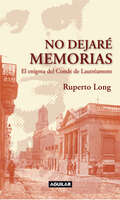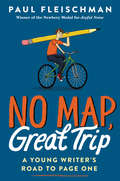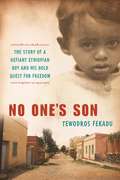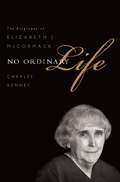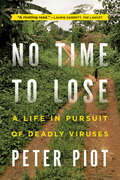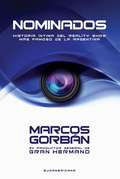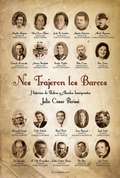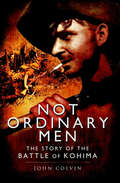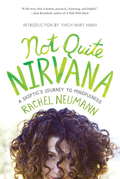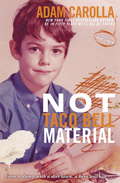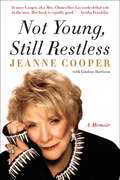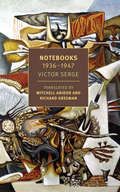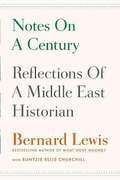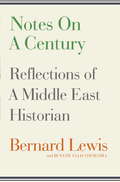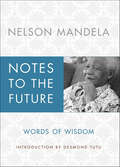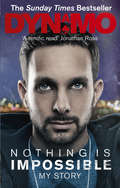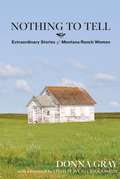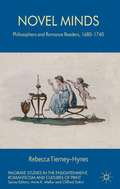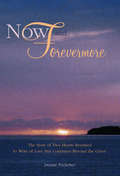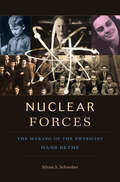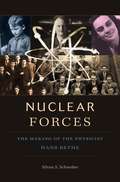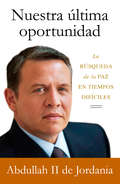- Table View
- List View
No dejaré memorias
by Ruperto LongUna singularísima crónica novelada que trata de develar «el enigma delConde de Lautréamont», aquel «estupendo uruguayo» que, a mediados del siglo XIX y con menos de veinte años, conmocionó el mundo dela época. No dejaré memorias. El enigma del conde de Lautréamont es unainvestigación que ?a lo largo de cinco años? Ruperto Long realizó en loslugares donde vivió Isidoro Ducasse, cuyo apodo fue Conde deLautréamont.Tarbes, Pau, Burdeos, París y muchas horas de estudio de documentos enla Biblioteca Nacional de Francia (BNF) arrojaron los elementospresumiblemente reales de la vida del Conde que aparecen en este libro.Long los ubicó histórica y culturalmente, completó los vacíos conintuiciones y especulaciones y así conformó esta crónica novelada sobrela vida real de Lautréamont, que sin duda fue apasionante y enigmática.Varios hechos indudables de la vida de este personaje permiten afirmarclaramente su carácter de uruguayo, a lo que él nunca renuncia porque ensu obra se llamó a sí mismo "el montevideano", y en su escritura enfrancés siempre utilizó muchos hispanismos y referencias al sur. Otrode los datos que aporta esta crónica es que, luego de cursar susestudios en Francia, volvió a su casa paterna en Montevideo, y enla única referencia escrita de su puño y letra dice "nacido enMontevideo (Uruguay)".Long también recrea en este libro el debate que surgió en el París de1952 entre los principales intelectuales del momento (Albert Camus,André Breton, Jean Paul Sartre, René Char, Octavio Paz, MauriceBlanchot, entre otros), cuyo epicentro fue la figura del Conde. Esteepisodio es importante porque permite comprender la gran influencia quetuvo Lautréamont sobre los surrealistas como Breton, Aragon, Dalí,Ernst, Man Ray, Miró,Buñuel y otros, y a través de ellos, en laconformación del mapa cultural del siglo XX, en un momento en que elMayo de 1968 ya se estaba incubando.Este libro recupera una parte de nuestro patrimonio cultural que aúnpermanece desconocido y olvidado.
No Map, Great Trip: A Young Writer's Road To Page One
by Paul FleischmanNewbery Medalist Paul Fleischman reflects on his childhood with his award-winning father, Sid Fleischman, and details his own path to becoming a writer in this memorable book that is part memoir, part travelogue, and part reflection on craft and creativity.No Map, Great Trip is an excellent choice for aspiring authors, language arts classrooms, and fans of Gail Carson Levine’s Writing Magic. Acclaimed author Paul Fleischman considers how growing up with a father who was an award-winning author helped to shape and inspire his own career. Paul and Sid Fleischman are the only father-son Newbery medalists in history, and life in the Fleischman home was extraordinary. Readers will feel like part of the family in this humorous and aspirational chronicle. Paul Fleischman is the author of the Newbery Award-winning Joyful Noise and the classroom classic Seedfolks, as well as many other acclaimed and beloved titles. His books are taught and performed in classrooms across the country.Part memoir, part travelogue (young Paul travels from California to New Hampshire by himself), part writing book, and part reflection on art and creativity, this inspirational book includes black-and-white photographs, as well as writing tips and prompts just right for budding authors. No Map, Great Trip is a great gift for young writers, language arts teachers, and for fans of Jack Prelutsky’s Pizza, Pigs, and Poetry and Ralph Fletcher’s A Writer’s Notebook.
No One's Son
by Tewodros Fekadu"An affirmation of life and the indestructibility of one man's will to make the most of it."-Ian Wynne, author of The Pawn and Shadows by My Side, former editor of Human Rights Defender, Amnesty InternationalBorn in the midst of the Ethiopian-Eritrean Civil War, Tewodros "Teddy" Fekadu survives abandonment and famine as his family flings him unwanted across borders and regions, into orphanages, and finally onto the streets of Addis Ababa. Spanning five countries and three continents, the Catholic Church, and Japanese detention centers, this is a tale of defiance and triumph, and also of family love-unacknowledged by his wealthy father, abandoned by his desperately poor mother, Teddy is nurtured along the way by staunch individuals despite his ambiguous place in rigid family tradition: his father's mother, a maternal aunt, a Catholic priest, and even his father's wife.In 2003, after three years in a Japanese detention center, Tewodros "Teddy" Fekadu won a hard-fought immigration battle, and his visa to Australia was approved. He now resides on the Gold Coast, where he founded an association that shares African traditions and heritage through performance and educational programs. He also works with organizations to resettle African refugees to the Gold Coast. He is an inspirational speaker, presenting to such diverse audiences as adoptive families, human rights groups, and East African immigrants. Tewodros' company, Moonface Entertainment, produces films and documentaries on East Africa. He regularly returns to Africa to shoot footage for his projects, and travels to the United States to promote his work.
No Ordinary Life: The Biography of Elizabeth J. McCormack
by Charles KenneyA biography of Elizabeth McCormack, regarded by many as the very soul of philanthropy whoseaunstinting practical advice and compassion have helped to inform the distribution of hundreds of millions of dollars to worthy causes around the world. a
No Time to Lose: A Life in Pursuit of Deadly Viruses
by Peter PiotAs a young scientist, Peter Piot named a newly discovered virus "ebola." This is the story of his extraordinary career. When Peter Piot was in medical school, a professor warned, "There's no future in infectious diseases. They've all been solved." Fortunately, Piot ignored him, and the result has been an exceptional, adventure-filled career. In the 1970s, as a young man, Piot was sent to Central Africa as part of a team tasked with identifying a grisly new virus. Crossing into the quarantine zone on the most dangerous missions, he studied local customs to determine how this disease--the Ebola virus--was spreading. Later, Piot found himself in the field again when another mysterious epidemic broke out: AIDS. He traveled throughout Africa, leading the first international AIDS initiatives there. Then, as founder and director of UNAIDS, he negotiated policies with leaders from Fidel Castro to Thabo Mbeki and helped turn the tide of the epidemic. Candid and engrossing, No Time to Lose captures the urgency and excitement of being on the front lines in the fight against today's deadliest diseases.
Noah Webster And His Words
by Jeri Chase Ferris Vincent X. KirschWebster’s American Dictionary is the second most popular book ever printed in English. But who was that Webster? <P><P>Noah Webster (1758–1843) was a bookish Connecticut farm boy who became obsessed with uniting America through language. <P><P>He spent twenty years writing two thousand pages to accomplish that, and the first 100 percent American dictionary was published in 1828 when he was seventy years old. <P><P>This clever, hilariously illustrated account shines a light on early American history and the life of a man who could not rest until he’d achieved his dream. <P><P>An illustrated chronology of Webster’s life makes this a picture perfect bi-og-ra-phy [noun: a written history of a person's life
NOMINADOS (EBOOK)
by Marcos GorbanGran Hermano es el reality show más importante del mundo. El de mayores audiencias, el de mayor facturación, el que más fantasías despierta. Los drogan? Les dan alcohol para que tengan sexo? Está todo arreglado? Por qué están tomando sol todo el día sin hacer nada? Están guionados? Los mitos que se tejieron alrededor del programa son muchos. Y han ido cambiando a través de los años. Pero hay muchas historias que el público y la prensa desconocen. Cuál fue la trastienda de los castings, de las galas en vivo, de las decisiones que más impacto tuvieron, desde la confesión de homosexualidad de Gastón hasta la inclusión de un ex presidiario en 2007?
Nos trajeron los barcos: Historias de padres y abuelos inmigrantes
by Julio Cesar ParissiVeinte personalidades de la cultura argentina cuentan sus historias deinmigración. Que la Argentina es un crisol de razas lo aprendimos en el colegio. Quecasi todos tenemos algún antepasado español, italiano, sirio, armenio,ruso, no es ninguna novedad. Pero es justamente esta característica laque nos une y logra que nuestras historias tengan puntos en común. Poreso, Julio Parissi entrevistó a veinte importantes personalidades de lacultura argentina para que cuenten sus historias de inmigración: Sarah yJoel, los padres de Cipe Lincovsky que escaparon desde Lituania paraasentarse en la zona del Abasto; o Agustín y Josefa, dos vascosemprendedores, abuelos de Juan Sasturain; o Antonio, el abuelo deEnrique Pinti que trajo su biblioteca desde un pueblito italiano, enplena década infame. Estas son solo algunas de las veinte historias conlas que todos nos sentiremos, inevitablemente, identificados.
Not Ordinary Men: The Story of the Battle of Kohima (Pen And Sword Military Classics Ser. #Vol. 26)
by John ColvinHaving driven the British and Indian Forces out of Burma in 1942, General Mutaguchi, Commanding the 15th Japanese Army, was obsessed by the conquest of India. In 1944 the British 14th Army, under its commander General Slim, drew back to the Imphal Plain, before Mutaguchis impending offensive. To the north, however, the entire Japanese 31 Division had crossed the Chindwin and, on April 5, arrived at the hill-station and road junction of Kohima, cutting off Imphal except by air, from the supply point at Dimpapur.Kohima was initially manned by only 266 men of the Assam Regiment and a few hundred convalescents and administrative troops. They were joined, on April 5, by 440 men of the Fourth Battalion of the Royal West Kent Regiment, straight from the Battle of Arakan.In pouring rain, under continual bombardment, this tiny garrison held the assaults of thirteen thousand Japanese troops in hand-to-hand combat for sixteen days, an action described by Mountbatten as probably one of the greatest battles in history ... in effect the Battle of Burma, naked, unparalleled heroism, the British/Indian Thermopylae.
Not Quite Nirvana
by Rachel NeumannThe book is a memoir of how a skeptical, fast-talking New Yorker became Thich Nhat Hanh's editor, turned forty, realized she was aging, and slowly and reluctantly started to absorb mindfulness practice and grow up. Scenes with Thich Nhat Hanh and the author's two vividly exuberant older parents, illustrate how the author adapts mindfulness techniques for the busyness of her life, without losing her edge. With honest and vivid stories about dealing with difficult relationships with family members, death, illness, vanity, exhaustion, and creating a safety net of joy, the author explores and offers guidance for three key mindfulness practices: Knowing When You're Available and When You're Not; Full-Attachment Living; and Interbeing (Other People are Not a Hobby).This book is designed for adults who are new to mindfulness practice, Buddhism, curious skeptics, people familiar with the practice who want a personal story, and those interested in memoir.
Not Taco Bell Material
by Adam CarollaIn his second book, Adam Carolla--author of New York Times bestseller In Fifty Years We'll All Be Chicks and chart-topping podcaster--reveals all the stories behind how he came to be the angry middle-aged man he is today. Funnyman Adam Carolla is known for two things: hilarious rants about things that drive him crazy and personal stories about everything from his hardscrabble childhood to his slacker friends to the hypocrisy of Hollywood. He tackled rants in his first book, and now he tells his best stories and debuts some never-before-heard tales as well. Organized by the myriad "dumps" Carolla called home--through the flophouse apartments he rented in his twenties, up to the homes he personally renovated after achieving success in Hollywood--the anecdotes here follow Adam's journey and the hilarious pitfalls along the way. Adam Carolla started broke and blue collar and has now been on the Hollywood scene for over fifteen years, yet he never lost his underdog demeanor. He's still connected to the working class guy he once was, and delivers a raw and edgy, fish-out-of-water take on the world he lives in (but mostly disagrees with), telling all the stories, no matter who he offends--family, friends or the famous.
Not Young, Still Restless: A Memoir
by Jeanne Cooper Lindsay HarrisonJeanne Cooper, the Emmy Award-winning American actress best known for her portrayal of Katherine Chancellor on the daytime soap opera The Young and the Restless, recounts the steps and missteps of her eight-decade career in Not Young, Still Restless. Exploring a career that began with the birth of a phenomenon called television, Cooper’s life story co-stars a cast of characters that reads like a who’s-who of Hollywood’s Golden Age: Frank Sinatra, Tony Curtis, Henry Fonda, and Shelley Winters, to name just a few. Intimate, honest, and inspiring, Not Young, Still Restless is a fascinating memoir of a life in daytime drama—and proof positive that that growing older doesn’t have to mean giving up.
Notebooks: 1936-1947
by Victor SergeAvailable for the first time, Victor Serge's intimate account of the last decade of his life gives a vivid look into the Franco-Russian revolutionary's life, from his liberation from Stalin's Russia to his "Mexico Years," when he wrote his greatest works.In 1936, Victor Serge—poet, novelist, and revolutionary—left the Soviet Union for Paris, the rare opponent of Stalin to escape the Terror. In 1940, after the Nazis marched into Paris, Serge fled France for Mexico, where he would spend the rest of his life. His years in Mexico were marked by isolation, poverty, peril, and grief; his Notebooks, however, brim with resilience, curiosity, outrage, a passionate love of life, and superb writing. Serge paints haunting portraits of Osip Mandelstam, Stefan Zweig, and “the Old Man” Trotsky; argues with André Breton; and, awaiting his wife’s delayed arrival from Europe, writes her passionate love letters. He describes the sweep of the Mexican landscape, visits an erupting volcano, and immerses himself in the country’s history and culture. He looks back on his life and the fate of the Revolution. He broods on the course of the war and the world to come after. In the darkest of circumstances, he responds imaginatively, thinks critically, feels deeply, and finds reason to hope. Serge’s Notebooks were discovered in 2010 and appear here for the first time in their entirety in English. They are a a message in a bottle from one of the great spirits, and great writers, of our shipwrecked time.
Notes on a Century: Reflections of a Middle East Historian
by Bernard Lewis Buntzie Ellis ChurchillThe #1 New York Times bestselling author of What Went Wrong? tells the story of his extraordinary lifeAfter September 11, Americans who had never given much thought to the Middle East turned to Bernard Lewis for an explanation, catapulting What Went Wrong? and later Crisis of Islam to become number one bestsellers. He was the first to warn of a coming "clash of civilizations," a term he coined in 1957, and has led an amazing life, as much a political actor as a scholar of the Middle East. In this witty memoir he reflects on the events that have transformed the region since World War II, up through the Arab Spring.A pathbreaking scholar with command of a dozen languages, Lewis has advised American presidents and dined with politicians from the shah of Iran to the pope. Over the years, he had tea at Buckingham Palace, befriended Golda Meir, and briefed politicians from Ted Kennedy to Dick Cheney. No stranger to controversy, he pulls no punches in his blunt criticism of those who see him as the intellectual progenitor of the Iraq war. Like America’s other great historian-statesmen Arthur Schlesinger and Henry Kissinger, he is a figure of towering intellect and a world-class raconteur, which makes Notes on a Century essential reading for anyone who cares about the fate of the Middle East.
Notes on a Century: Reflections of A Middle East Historian
by Bernard Lewis Buntzie Ellis ChurchillThe memoirs of the greatest living historian of the Middle East, Professor Bernard Lewis.After 9/11, people who had never given much thought to the politics of the Middle East found themselves wondering why there was such rage brewing in the region. Many of them turned to Bernard Lewis for an explanation. The world's pre-eminent historian of the Middle East, Lewis was among the first to identify the phenomenon of Islamic fundamentalism.In this exceptional memoir, he looks back over his long career - taking us from his discovery of the Crusades, as a young boy in London, and his service in British intelligence during the Second World War, through to the Iraq wars, the crisis with Iran, and the great upheavals of the Arab Spring.Over the course of his distinguished career, he has at times been as much a player in political events as well as a scholar. He has advised monarchs, presidents, prime ministers and dissidents in the Middle East and elsewhere. Now 95, and still sharper than most college students, he writes with barbed wit about the people he has known and the events he has witnessed and participated in. No subject is more fraught in the Middle East than history - and so Bernard Lewis has found himself unexpectedly part of the story that he tells in this extraordinary memoir of a life that spans the 20th century, and has already had a great impact on the 21st.
Notes on a Century: Reflections of A Middle East Historian
by Bernard Lewis Buntzie Ellis ChurchillThe memoirs of the greatest historian of the Middle East, Professor Bernard Lewis.After 9/11, people who had never given much thought to the politics of the Middle East found themselves wondering why there was such rage brewing in the region. Many of them turned to Bernard Lewis for an explanation. The world's pre-eminent historian of the Middle East, Lewis was among the first to identify the phenomenon of Islamic fundamentalism.In this exceptional memoir, he looks back over his long career - taking us from his discovery of the Crusades, as a young boy in London, and his service in British intelligence during the Second World War, through to the Iraq wars, the crisis with Iran, and the great upheavals of the Arab Spring.Over the course of his distinguished career, he has at times been as much a player in political events as well as a scholar. He has advised monarchs, presidents, prime ministers and dissidents in the Middle East and elsewhere. Now 95, and still sharper than most college students, he writes with barbed wit about the people he has known and the events he has witnessed and participated in. No subject is more fraught in the Middle East than history - and so Bernard Lewis has found himself unexpectedly part of the story that he tells in this extraordinary memoir of a life that spans the 20th century, and has already had a great impact on the 21st.
Notes on a Century: Reflections of a Middle East Historian
by Bernard Lewis Buntzie Ellis ChurchillNotes on a Century is a great historian's vivid and insightful episodic reflections on his life, from his childhood as a confident, clever little boy to his energetic old age in the present day. He is always at pains to explain the importance of the role of a historian: in contrast to other academic disciplines he unwittingly breaks his own mould, being a diplomat, spy, polyglot and philosopher in addition to his historical calling. Coming from a relatively secular anglicised Jewish family, Bernard Lewis's interest in the Middle East seemed to be innate rather than a reflection of his own personal history. His insistence on the importance of the primary source was one of his motivating factors in learning so many languages fluently. His academic life was interrupted by the Second World War, but his language skills and knowledge base were put to good use in the Secret Service. Although his primary historical focus is on the Ottoman Empire, his expertise and language knowledge led to his involvement in the modern-day Middle Eastern conflict. His list of contacts and connections is truly impressive, and he has - at some time - been in touch with most of the main political players of the region. There is also a considerable human dimension to his narrative. He cites a Japanese woman exclaiming at his knowledge of Japanese in Israel, but commenting in perfect Hebrew. Notes on a Century is not only a fascinating memoir but addresses the uniquely difficult recent history of the Middle East from a wise and superbly well-informed perspective - that of the region's finest historian.
Notes to the Future: Words of Wisdom
by Nelson MandelaFrom the heart and soul of visionary Nobel Peace Prize winner Nelson Mandela, a collection of his most uplifting, time-honored quotes that have inspired our world and offer a path for peace.&“The book that you hold in your hands is nothing short of a miracle.&” —Desmond Tutu, from the IntroductionNotes to the Future is the definitive book of quotations from one of the great leaders of our time. This collection—gathered from privileged access to Mandela&’s vast personal archive of private papers, speeches, correspondence, and audio recordings—features more than three hundred quotations spanning more than sixty years and includes his Nobel Peace Prize acceptance speech.These inspirational quotations, organized into four sections—Struggle, Victory, Wisdom, and Future—are both universal and deeply personal. We see Mandela&’s sense of humor, his loneliness and despair, his thoughts on fatherhood, and the reluctant leader who had no choice but to become the man history demanded.&“A good pen can also remind us of the happiest moments in our lives, bring noble ideas into our dens, our blood and our souls. It can turn tragedy into hope and victory&” (from a letter to Zindzi Mandela, written on Robben Island, February 10, 1980).
Nothing Is Impossible: The Real-Life Adventures of a Street Magician
by Dynamo'I immersed myself in magic. I read every book I could get my hands on and practised and practised, day after day and night after night. Magic became my world...some might say an obsession.'When you’re a kid life can seem tough; tougher for some than others. But the darkest of times can also be the most enlightening.When his late granddad showed him magic for the first time, Steven Frayne knew there was more to life than hiding from bullies. He had a destiny. A calling. In that moment Dynamo was born: the most exciting magician of the 21st century. Since then, Dynamo has shocked, thrilled and amazed men, women and children, from all walks of life, all over the world. With his mind-blowing illusions, he has catalysed a whole new era of magic. Now, in his very first book, Dynamo invites you to join him on a breathtaking journey across the globe. Be prepared to levitate Lindsay Lohan in Singapore, transform snow into diamonds in the Austrian mountains, and walk on water across the River Thames. Along the way, he reveals how to make the impossible possible, what it takes to pull off the greatest stunts man has seen, and why everyone needs magic in their lives. This is no illusion. This is Dynamo revealed.
Nothing to Tell: Extraordinary Stories of Montana Ranch Women
by Donna GraySitting at the kitchen tables of twelve women in their eighties who were born in or immigrated to Montana in the late nineteenth or early twentieth century, between 1982 and 1988 oral historian Donna Gray conducted interviews that reveal a rich heritage. In retelling their life stories, Gray steps aside and allows theses women with supposedly "nothing to tell" to speak for themselves. Pride, nostalgia, and triumph fill a dozen hearts as they realize how remarkable their lives have been and wonder how they did it all. Some of these women grew up in Montana in one-bedroom houses; others traveled in covered wagons before finding a home and falling in love with Montana. These raw accounts bring to life the childhood memories and adulthood experiences of ranch wives who were not afraid to milk a cow or bake in a wooden stove. From raising poultry to raising a family, these women knew the meaning of hard work. Several faced the hardships of family illness, poverty, and early widowhood. Through it all, they were known for their good sense of humor and strong sense of self.
Novel Minds
by Rebecca Tierney-HynesEighteenth-century philosophy owes much to the early novel. Using the figure of the romance reader this book tells a new story of eighteenth-century reading. The impressionable mind and mutable identity of the romance reader haunt eighteenth-century definitions of the self, and the seductions of fiction insist on making an appearance in philosophy.
Now & Forevermore: The Story of Two Hearts Reunited to Write of Love
by Denise FecketterTwenty-three years after her husband's death, his spirit returned to share universal truths and to answer the author's questions about living and loving. This is their conversation.
Nuclear Forces: The Making of the Physicist Hans Bethe
by Silvan S. Schweber“A highly readable account . . . tracing the future Nobel laureate through his formative years and up to the eve of World War II” (The Wall Street Journal).On the fiftieth anniversary of Hiroshima, Nobel-winning physicist Hans Bethe called on his fellow scientists to stop working on weapons of mass destruction. What drove Bethe, the head of Theoretical Physics at Los Alamos during the Manhattan Project, to renounce the weaponry he had once worked so tirelessly to create? That is one of the questions answered by Nuclear Forces, a riveting biography of Bethe’s early life and development as both a scientist and a man of principle.As Silvan Schweber follows Bethe from his childhood in Germany, to laboratories in Italy and England, and on to Cornell University, he shows how these differing environments were reflected in the kind of physics Bethe produced. Many of the young quantum physicists in the 1930s, including Bethe, had Jewish roots, and Schweber considers how Liberal Judaism in Germany helps explain their remarkable contributions. A portrait emerges of a man whose strategy for staying on top of a deeply hierarchical field was to tackle only those problems he knew he could solve.Bethe’s emotional maturation was shaped by his father and by two women of Jewish background: his overly possessive mother and his wife, who would later serve as an ethical touchstone during the turbulent years he spent designing nuclear bombs. Situating Bethe in the context of the various communities where he worked, Schweber provides a full picture of prewar developments in physics that changed the modern world, and of a scientist shaped by the unprecedented moral dilemmas those developments in turn created.Praise for Nuclear Forces“Schweber’s account of Hans Bethe’s life . . . reveals the origins of a charismatic scientist, grounded in the importance of his parents and his Jewish roots . . . [Schweber] recreates the social world that shaped the character of the last of the memorable young scientists who established the field of quantum mechanics.” —Publishers Weekly“Nuclear Forces is a carefully researched, historically and biographically insightful account of the development of a profession and of one of its leading representatives during a century in which physics and physicists played key roles in scientific, cultural, political, and military developments.” —David C. Cassidy, author of A Short History of Physics in the American Century
Nuclear Forces: The Making of the Physicist Hans Bethe
by Silvan S. SchweberOn the fiftieth anniversary of Hiroshima, Nobel-winning physicist Hans Bethe called on his fellow scientists to stop working on weapons of mass destruction. What drove Bethe, the head of Theoretical Physics at Los Alamos during the Manhattan Project, to renounce the weaponry he had once worked so tirelessly to create? That is one of the questions answered by Nuclear Forces, a riveting biography of Bethe’s early life and development as both a scientist and a man of principle. As Silvan Schweber follows Bethe from his childhood in Germany, to laboratories in Italy and England, and on to Cornell University, he shows how these differing environments were reflected in the kind of physics Bethe produced. Many of the young quantum physicists in the 1930s, including Bethe, had Jewish roots, and Schweber considers how Liberal Judaism in Germany helps explain their remarkable contributions. A portrait emerges of a man whose strategy for staying on top of a deeply hierarchical field was to tackle only those problems he knew he could solve. Bethe’s emotional maturation was shaped by his father and by two women of Jewish background: his overly possessive mother and his wife, who would later serve as an ethical touchstone during the turbulent years he spent designing nuclear bombs. Situating Bethe in the context of the various communities where he worked, Schweber provides a full picture of prewar developments in physics that changed the modern world, and of a scientist shaped by the unprecedented moral dilemmas those developments in turn created.
Nuestra última oportunidad: La búsqueda de la paz en tiempos difíciles
by King Abdullah IIUnas memorias reveladoras del rey de Jordarnia, que se enfrenta al mayor desafío del mundo en la actualidad, el conflicto de Oriente Próximo. El mundo quedó asombrado cuando el rey Husein de Jordania, en su lecho de muerte, nombró sucesor a su hijo, en vez de a su hermano, primero en la línea de sucesión. Pero el primer sorprendido fue el propio Abdullah, entonces el joven jefe de las tropas especiales, cuya vida iba a dar un vuelco radical. Esta es la fascinante historia de un joven príncipe que estudió en un internado en Estados Unidos y luego en una academia militar en el Reino Unido, siempre convencido de que sería un soldado. De regreso a casa, persiguió terroristas y modernizó las tropas especiales de Jordania, hasta que, de improviso, se vio en el trono. Junto a la reina Rania, redefinió el significado de la monarquía, mientras su esposa se convertía en la más ferviente defensora de los derechos de la mujer en el mundo musulmán. En estas memorias insólitamente sinceras, y desde su posición de interlocutor fundamental entre Occidente y el mundo árabe, el rey Abdullah habla sin ambages del problema más complejo al que se enfrenta, el conflicto palestino-israelí, sin soslayar el impacto de la guerra de Irak o cómo abordar las ambiciones nucleares de Irán. ¿Por qué un jefe de Estado en ejercicio escribe sobre los temas más delicados que ha de afrontar? Porque estamos ante un momento decisivo: nuestra última oportunidad para lograr la paz en Oriente Próximo. Reseñas:«Un libro excepcional que combina con maestría lo político y lo personal.»The Spectator «Una gran aportación, parte autobiografía, parte historia política, enriquecida con numerosos retratos de primera mano de líderes estadounidenses, israelíes, palestinos e iraquíes.»Foreign Affairs «Un libro lleno de valor y de verdad.»The Globe and Mail
